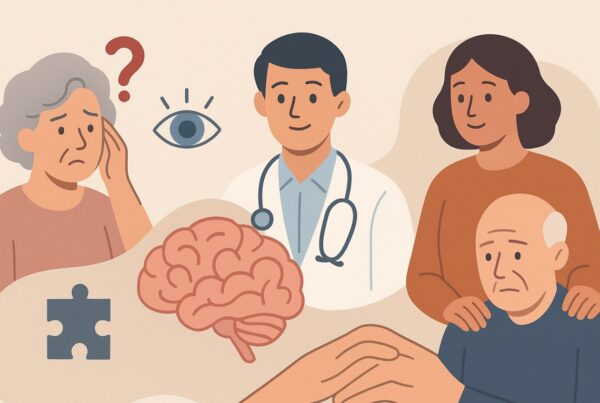When Memory Fades, Connection Matters — The Real Changes Behind Dementia
When someone you love develops dementia, it’s natural to focus on the symptoms you can see — memory loss, confusion, or personality changes. But dementia isn’t just “forgetfulness.” It’s a physical disease that changes how the brain works and communicates.
At Tapas Elder Care, we believe that when caregivers understand these brain changes, they can respond with more compassion and confidence.
Dementia Is a Physical Brain Condition — Not Just a Mental One
The human brain functions like a vast, interconnected city. Billions of nerve cells (neurons) send electrical and chemical signals that help us think, speak, and act.
When dementia develops, this network begins to break down — roads get blocked, power lines snap, and communication slows or stops.
How Dementia “Rewires” the Brain
- Alzheimer’s Disease: The Roadblocks and Tangled Wires
Plaques (Roadblocks): Abnormal amyloid proteins build up between brain cells and block messages from passing through.
Tangles (Twisted Wires): Tau proteins twist inside the neurons, damaging their wiring until the cells die. - Vascular Dementia: The Power Outages
Reduced blood flow — often caused by small strokes — deprives certain brain areas of oxygen. These “power cuts” kill brain cells and cause cognitive decline.
Everyday Examples of Dementia’s Impact
When dementia damages the brain’s wiring, the effects become real and visible. Your loved one isn’t failing to try — the part of their brain that controls certain tasks is physically damaged.
Here are a few simple examples:
Example 1: The “Lost” Cup of Tea
The Task: Making a cup of tea seems simple — find the mug, get the tea bag, boil water, pour it, and add milk.
The Healthy Brain: Stores the “recipe” for making tea and connects the steps in the right order.
The Dementia Brain: Breaks the link between “boil the water” and “pour the water.” Damage in the memory area might make it hard to recall where the tea bags are.
What You See: Your loved one might boil the kettle but forget why. They might pour milk before hot water. The sequence gets jumbled because the brain’s connections have broken. physical connections are broken.
Example 2: “Why Are You Asking Me That?” (Word-Finding)
The Task: Naming a common object, like a “watch.”
The Healthy Brain: Recognizes the object and sends a signal to the language center to retrieve the word “watch.”
The Dementia Brain: Faces a blocked “road” to the language center. Your loved one knows what the object is and how it’s used, but can’t recall the word.
What You See: They may get frustrated or describe it as “that thing on my arm” or “the time-teller.”
Example 3: Sudden Changes in Mood
The Task: Managing emotions.
The Healthy Brain: Uses the frontal lobe to filter and control frustration or impatience.
The Dementia Brain: Often loses this filter early on.
What You See: Your loved one may get upset easily or say things that seem out of character. This isn’t a personality change — it’s a physical symptom of brain damage, just like memory loss.
Understanding Is the Key to Compassion
When your loved one repeats questions, forgets steps, or reacts strongly, remember — they aren’t being stubborn or difficult. They’re trying to navigate a brain that changes physically every day.
Their inner “city” now has roadblocks, detours, and power cuts. As caregivers, we must help them navigate their new map instead of expecting them to follow the old one.
At Tapas Elder Care, we don’t just care for our residents — we step into their world with patience, dignity, and expert support.
You don’t have to walk this journey alone.
Understanding what’s happening in the brain is the first step toward compassion and better care.
Visit Tapas Elder Care at our centers in Balewadi, and receive professional counselling to support your caregiving journey.





